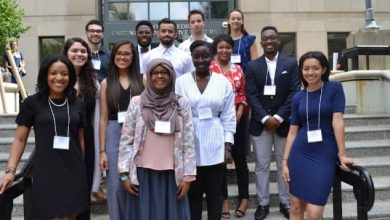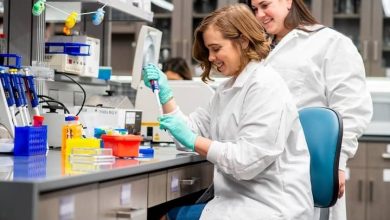List of Biology Certificate Programs

A biology certificate program often includes instruction in crucial scientific theory and practice principles. Students may also enroll in certificate programs related to their field of study, such as horticulture or biotechnology, in addition to this core instruction. A biology certificate can benefit students in a range of disciplines because of the combination of core concepts and specialized instruction.
Students who have earned a certificate in biology typically have great research and logical thinking abilities. They are problem solvers with a strong understanding of scientific methodology. These abilities can lead to a variety of employment prospects in science and academics.
The length of a certificate program is frequently determined by the student’s full-time or part-time status. The cost of the program varies depending on where you live, what institution you attend, and which course you choose. If you want to learn more about the cost of a biology certificate, you should contact the schools that interest you and ask for further information.
Students who earn a certificate in biology have a wide range of job opportunities. Some people go on to work in the laboratory or environmental technologists. Other students may opt to work in bioproduction, conservation, agriculture, arboriculture, or other green industry jobs depending on their areas of study. The program can provide a strong foundation of scientific knowledge that can be used for a variety of careers. The benefits of a biology certificate apply to students who want to start working right away as well as those who want to continue their studies.
Many colleges have started offering online courses and programs, allowing for quicker registration and a more flexible timetable.
List of Biology Certificate Programs
The Registered Environmental Professional (REP) Certificate
The Registered Environmental Professional (REP) Certificate is a graduate-level credential that prepares holders for project management and coordination positions. Candidates for REP programs must have a master’s degree in environmental science or a comparable subject. Candidates with a bachelor’s degree and equivalent work experience may be admitted to the program in some situations. This program recognizes environmental scientists as senior professionals who have achieved a high level of professional achievement in their area. When applying for environmental science project manager employment, it may make your application stand out.
Specialist in Microbiology
Those wishing to expand their laboratory skills to work with minute creatures such as bacteria, fungus, parasites, and viruses may benefit from a Specialist in Microbiology degree. Candidates with a bachelor’s degree and at least three years of industry experience are eligible to pursue this certificate. Candidates must also pass a written test in order to apply for a Specialist in Microbiology certificate program. This certificate must be renewed every three years for those who have earned it. This degree may help you obtain specific research skills for working with microscopic organisms, which may broaden your job prospects in microbiology.
The Occupational Safety and Health Administration (OSHA)
The Occupational Safety and Health Administration (OSHA) offers lab safety certification. Some laboratories may need this certification for all personnel in order for them to work safely with lab equipment and materials. Because biology laboratories may use hazardous materials, learning how to work properly with specific substances and pieces of equipment is critical to ensuring the health and safety of all laboratory personnel. This certificate program is open to anybody who meets the requirements. OSHA provides both 10-hour and 30-hour online training programs that users can take at their own leisure.
Genetics and Genomics Graduate Certificate
Earning a certificate in genetics and genomics might be beneficial for those interested in pursuing a medical career and using the study of human genes to their practice. A bachelor’s degree in biology or a related discipline is required for this certificate. The one-year certificate program focuses on clinical and research abilities in the field of genetics and requires one year to finish. Because it introduces students to the foundations of genetic research and clinical evaluation, earning this certificate can be a suitable choice for those interested in pursuing medical school or graduate school to become a genetic counselor.
Certificate in Zoo and Aquarium Science
A certificate in zoo and aquarium science is a good option for those interested in a career in zoology or wildlife biology. Candidates who have completed their high school education or its equivalent are eligible to participate in this certificate program. Students must complete a classroom-based curriculum followed by a term of practical training at a zoo or other residential animal facility to graduate from this certificate program. This certificate teaches students how to build habitats for captive animals, how to handle and train animals, how to avoid sickness, and how to care for the everyday requirements of animals in zoos, aquariums, and other facilities.
Certificate in Medical Laboratory Technology
Before a medical laboratory technician can practice in several states, they must first obtain certification. Candidates must receive a degree from an accredited medical lab technician program or finish a certain amount of credit hours in a related discipline, such as biology or chemistry, as part of a bachelor’s degree program to be eligible for this certification. Candidates should also have at least three years of experience working in a lab, which they can obtain through an internship or other work opportunity. Candidates must pass an exam after achieving these prerequisites in order to achieve certification and qualify for state licensing.
Related Post:How to Withdraw College Application
List of Biology Careers
Dentistry
A basic understanding of biology (particularly human anatomy) is essential for a career in dentistry. You must complete a recognized postgraduate program in dentistry, dental surgery, or dental medicine after completing an undergraduate degree. After that, you can begin practicing dentistry by registering with the Dental Board of Australia. Plan to obtain a Vocational Education and Training (VET) qualification in oral health if you want to be a dental hygienist (dental hygiene).
Environment Science
A biology degree is a great way to get started in this industry. Environmental scientists research the environment and use their findings to develop strategies and policies to conserve the air, water, flora, wildlife, and other natural resources. Gaining considerable field experience during your degree and finding an environmental science support employment before or soon after graduation is a smart approach to transition from student to professional.
Genetics
Take a lot of genetics and chemistry classes in college if you want to work in this industry. Postgraduate genetics courses can also help you advance your job. Conducting specialized tests is a part of a genetics laboratory job. Cytogenetics laboratories look for chromosome-related diseases, while molecular labs look for genetic alterations. A postgraduate degree in genetic counseling is required. They assist their clients in comprehending the relationship between genetics and physical, psychological, reproductive, and familial challenges and conditions.
Teacher in a secondary school
Are you interested in instructing high school biology students? After earning a bachelor’s degree in biology, you can enroll in a Master of Teaching (Secondary) program. Biology studies would be combined with units in other subjects in the ideal undergraduate curriculum. Mathematics, languages, humanities and social sciences, English, design and technology, and the arts are examples of second-learning areas (media arts, visual arts, dance, drama, or music).
Technician in a laboratory
A career as a laboratory technician, such as one in a medical or microbiological lab, will benefit from your biology knowledge and expertise. Enroll in a postgraduate laboratory technology program after you finish your undergraduate degree. Working as a medical laboratory technician entails testing human body specimens (such as blood and urine) in order to aid in disease diagnosis and treatment. Other responsibilities could include writing reports and ensuring quality control standards are met.
Medical Investigations
To learn more about diseases and cures, medical researchers perform tests and other studies. Continue your study beyond a bachelor’s degree, maybe acquiring a PhD or MD degree, to create a profession in this field. Universities, hospitals, and pharmaceutical corporations are all places where these individuals might be located. They have a very good average wage. Australia has a thriving medical research industry that is backed by substantial public financing.
Medicine
A four-year graduate entrance medical degree program is required to become a doctor. To be considered for admission to such a program, you must take the GAMSAT (Graduate Australian Medical Schools Admissions Test). Taking anatomy, biochemistry, and physiology courses as part of your undergraduate degree is an excellent idea. Volunteering and demonstrating that you have made contributions to the community will help you stand out in the medical school admissions process.
Related Post:List of Pharmacy Schools in Virginia
Microbiology
Microbiologists study fungus, viruses, bacteria, archaea, algae, protozoa, and prions, which are microorganisms or microbes that are too small to view with the naked eye. A Bachelor of Science degree makes it possible for you to specialize in your chosen field by choosing units of your choice. Note that most employers will require postgraduate degree, and even upto to the doctoral level. To be successful in this field, you must have a sharp mind and well-developed analytical skills.
Nursing
Nursing is a lucrative profession with plenty of opportunities for promotion, but it’s also a very hard one. However, if you’re a well-organized and active person who wants to devote your life to helping others, it could be the ideal vocation for you. Apply to a graduate-entry master’s degree program (which lasts two years) after you finish your biology degree. After you’ve completed your nursing degree, you’ll need to obtain a license to practice.
Pharmacist
A master’s degree in pharmacy is required for a profession as a pharmacist. Because this program is highly competitive, you’ll need to work extra hard and get outstanding grades during your undergraduate studies. Chemistry, biochemistry, physiology, and mathematics are all relevant courses. The master’s program is followed by an internship with a licensed pharmacist. Preparing and administering prescriptions, providing pharmaceutical counseling, and promoting community health awareness are just a few of a pharmacist’s responsibilities.
Research Assistant
In many cases, research assistants operate in a laboratory setting. Many of the assistants are young scholars pursuing a PhD. The classic job activity is conducting experiments. If you’re interested in working in this field, you’ll need to show that you’re conscientious and pay close attention to detail. It is necessary to operate as a team as well as pursue individual goals. It’s best if you have a biology degree with a lot of research and lab experience. Working as a research assistant can lead to a position as a primary researcher.
What steps do I need to take to become a Certified Biologist?
Complete a Bachelor’s Degree-
If you want to become a licensed biologist, this is the first step you should take. For entry-level professions in Biology, such as microbiologist and wildlife biologist, a bachelor’s degree is required.
Find a Specialty
When it comes to becoming a certified biologist, you should focus on a field that interests you. This helps you prepare for specific job pathways and prepares you for the certification you’ll eventually pursue.
Students can concentrate their talents by seeking internships, laboratory experience, or work experience with many biology degrees.
Internships in biology help you gain the practical experience you need to become a qualified biologist.
As an intern, you might work as a research assistant in a lab, as a wildlife biology intern in a zoo, or in an office aiding experienced biologists.
Consider obtaining a biology certification. Most employers prefer applicants who have obtained a biology certification. When looking at credentials, keep in mind the cost of tuition, online possibilities, and concentrations.
You should also choose a field of biology that you are passionate about, as this is likely to be what you will be doing for the rest of your life.
Related Post:Nursing Student Skills for your Resume
Obtain Experience
After earning your biologist certification, you can seek employment to gain experience and further your career as far as you wish.
Become a Certified Biologist by earning your certification.








